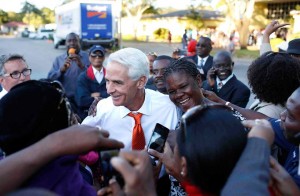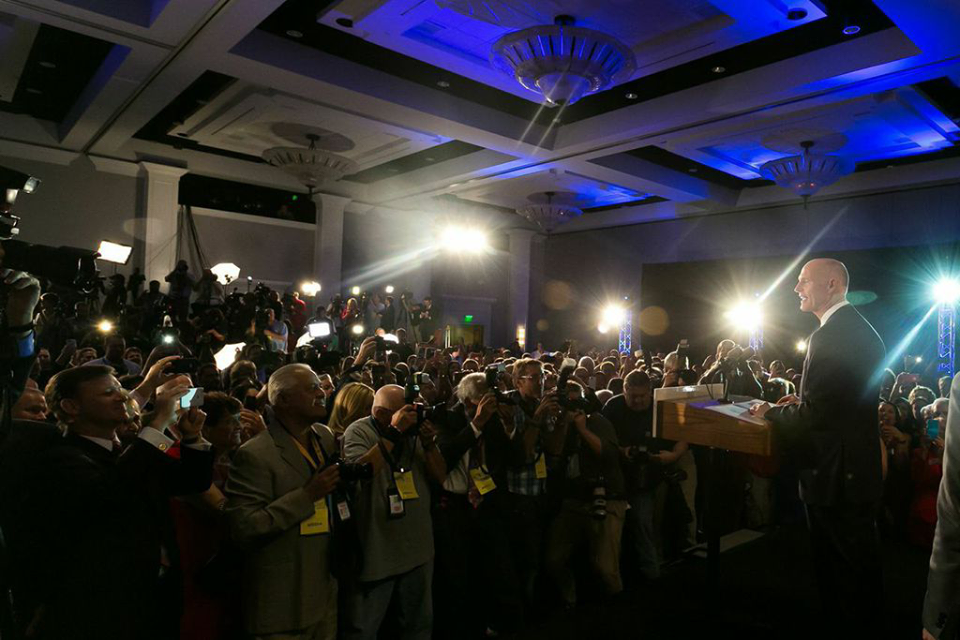What Rick Scott’s reelection means for 2016 and beyond
The most important election result in November’s Democratic wipe out was the sixth Senate seat the GOP picked up to give it control of the upper chamber.
When Colorado was called for Republican Cory Gardner, it became clear that the Senate was lost for Democrats – and with it, President Obama’s ability to reshape America’s judicial landscape. With a just-say-no House of Representatives already in Republican hands, Obama’s ability to appoint judges – appointments which only the previously Democratic-controlled Senate could confirm or deny – was the only issue that was really at stake at the federal level.
But the second most important election result was not at the federal level at all. Florida’s gubernatorial contest between Republican Rick Scott and Republican-turned-Democrat Charlie Crist was one of very few contests that’s heavy on both symbolism and real-life significance.
Democrats were unable to turn an excommunicated Republican who had lamented the rise of the far right into a successful standard bearer. Even worse, they lost every statewide election for the second cycle in a row, and lost six seats in the state legislature that was already heavily dominated by Republicans.

The consequences of this are going to be enormous in a state with twenty million people. Rick Scott isn’t going to expand Medicaid for 800,000 Floridians (I know he signaled an openness to the idea during the election, but just watch).
He’s going to have the opportunity to appoint up to four new justices to the Florida Supreme Court, and that will mark a judicial shift that eliminates the last roadblock to complete conservative control of the state.
Expect big businesses to be able to run amok in the Sunshine State, contaminating air and water and abusing monopolies with impunity all while knowing Scott’s handpicked judges will have their backs in any lawsuit, while the state government turns a blind eye.
A state Democratic Party has sunk even lower from its 2010 nadir. Chairwoman Allison Tant would be fortunate to keep her job after the meltdown that took place under her watch – although with the challenges that the party faces going forward, her saving grace may be that no one else wants it.
Rick Scott won in part because he was able to inundate Florida with ads, paid for not just by mega donors but also with $12.5 million of his own money. While Charlie Crist was able to raise tens of millions as well, and had the support of billionaire environmentalist Tom Steyer, Scott still outspent him by some $30 million – including a closing weekend ad blitz in which Scott spent $1,200 per minute on campaign ads.
The GOP nominee in 2018 is unlikely to have a net worth in the hundreds of millions of dollars, as Scott does. But he or she won’t need to, thanks to the state GOP’s ability to fundraise. Republicans hold all of the marbles in Tallahassee, and that means they can count on support from the state’s wealthiest donors – people like Harry Sargeant, Crist’s fraternity brother at Florida State University, now a billionaire who has contributed more than $1.5 million to the state GOP’s coffers. Any businessman, tycoon or special interest who needs a favor in the capital will get the GOP’s attention through donations, while Democrats won’t be a factor.
That’s just the political reality.

Florida Democrats will be shut out at the state level, something they’ve had to get used to since 1998. They’ll have to stand by helplessly as Scott transforms the courts and rams pro-business, anti-environment laws though a compliant legislature. The party will be cash-starved and ignored.
But Florida Democrats still may have something to smile about in 2016.
That’s because, as miserable as the election results in Florida were for Democrats, the trend lines were still favorable – and they point to an inevitable Democratic resurgence in the state. Miami-Dade, where Democrats have been swelling their margins, saw low turnout well below the statewide average. And yet, Crist netted 100,000 votes in Florida’s largest county, besting 2010 nominee Alex Sink by around 40,000 and showing that the transformation in South Florida that saved Obama in 2012 isn’t just continuing, but accelerating.
Rick Scott and his GOP allies will go all out in 2016 to rig the state for the GOP, as they always do. We can expect further attacks on voting rights, and especially an elimination of Sunday early voting, so as to derail the “Souls to the polls” movement that almost ended Scott’s reelection prospects. And in 2016, as people stand in line for more than eight hours in Democratic strongholds like Miami-Dade, we can forget about Scott extending early voting.
But I don’t think that will be enough for the GOP to win Florida in 2016 amid presidential-level turnout. The demographic changes in the state are picking up steam; there will be hundreds of thousands more Hispanic and black citizens eligible to vote than there were in 2012, when Obama won by 74,000 votes.
The once-reliable Cuban vote for Republicans is showing cracks; two years after Obama nearly drew even with this demographic, Crist won them by one point. Meanwhile Hillary Clinton can be expected to do at least a little better with the state’s white voters than Obama did. “I think she’ll be a very strong candidate,” says Tampa Bay Times political guru Adam Smith, who knows the state’s political terrain as well as anyone.
Florida’s Democratic Party will continue to be shut out at the state level for the foreseeable future. That’s a consequence of having a political base that doesn’t show up during midterms. But as Democratic constituencies continue to grow faster than Republican ones, the prospects for Democrats at the presidential level still look strong.
William Dahl is a recent graduate of The College of William and Mary, where he majored in Government and studied abroad in La Plata, Argentina. He has worked for community foundations in Argentina and Miami dedicated to community engagement and prosecution for human rights abuses. A native Virginian, he moved to Baltimore in 2013 to join a financial research firm, where he enjoys being able to write on the side.

